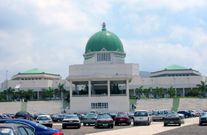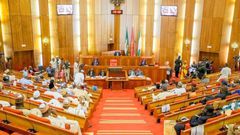Northern Patriots, a respected socio-political advocacy group in Nigeria’s northern region, has raised strong allegations against lawmakers representing the North. The group claims these legislators have neglected their constituents by remaining silent on what it describes as the diversion of significant national resources toward projects outside the framework of the proposed 2025 budget, the majority of which, the group asserts, are focused in the South-West.
According to Northern Patriots, members of the National Assembly—especially those from the northern states—have failed to challenge decisions they believe amount to a “grand betrayal of trust” and an alleged “deliberate attempt to economically isolate the North.” These claims have stirred debate across political circles, sparking a heated conversation about equitable development and fiscal transparency.
In an official statement issued by its president, Alhaji Babagida Muazu, the group alleges it has obtained substantial intelligence indicating that numerous infrastructure and social projects are presently being executed by the Federal Government without inclusion in the 2025 Appropriation Act. This, the group asserts, raises crucial questions about adherence to fiscal discipline and the constitutional mandate of the National Assembly.
Highlighting the gravity of the issue, Northern Patriots claims the projects in question, reportedly worth billions of naira, are taking place outside the approved government expenditure plan for the year. The group insists this sidesteps established budgetary procedures and undermines trust in Nigeria’s governance structures.
In the words of Alhaji Muazu, “It is a scandal of monumental proportions. The Federal Government is implementing projects that were never approved by the National Assembly, and yet the very lawmakers empowered to check such abuses have chosen to remain silent. Their silence is complicity.”
Focus on Northern Lawmakers

The National Assembly building.
Although the critique extends to the entire National Assembly, Northern Patriots specifically directed harsh words at northern lawmakers, accusing them of neglecting the urgent needs of their constituents during a period of immense regional challenges.
“The silence of northern legislators is a betrayal of the mandate of their people,” Muazu argued. “Rather than defending those who put them in office, they have become mere errand boys for the executive.”
“They participate in oversight visits that often end in brown-envelope settlements instead of honest scrutiny. They pass budgets without careful review. Today, they stand by as projects outside the national budget are disproportionately channeled to a particular region, neglecting millions of northern citizens.”
The organization went so far as to characterize the existing assembly as the “most docile and directionless since 1999,” contending that lawmakers have abandoned their constitutional powers and become, in their words, “a rubber stamp for sectional interests.”
Accusations of regional bias have reemerged as a flashpoint in Nigerian governance. The Northern Patriots assert that most recent projects are being implemented in the South-West, fueling claims of political maneuvering designed to allocate public resources for sectional benefit at the expense of others.
“The National Assembly has sold out Nigerians for a cup of garri,” the statement added. “What we’re witnessing goes beyond mismanagement—this is a sectional agenda enabled by legislative silence.”
The group also criticized the current leadership of both chambers in the National Assembly, claiming they preside over a “compromised parliament” that no longer acts in the interest of ordinary Nigerians.
Call for Recall of Lawmakers
Against this backdrop, Northern Patriots revealed plans to collaborate with civil society groups, traditional rulers, and youth organizations across the 19 northern states to launch a recall campaign. The aim is to empower citizens to remove representatives who fail to advocate for fairness and transparency.
“We cannot continue to tolerate this level of irresponsibility,” said Muazu. “Any senator or member of the House of Representatives who refuses to speak against this injustice should face recall. We will take this message to every ward, every local government, and every emirate council.”
He went on to describe the National Assembly as having become a “marketplace for personal gain” rather than prioritizing the national interest. According to him, it is time for the people to assert their authority and reclaim Nigeria’s democratic space before it is, in his words, “completely sold off.”
Next Steps and Broader Warning
The group announced plans to publish a comprehensive report cataloguing the specific projects alleged to be executed beyond the approved federal budget, including the government agencies involved in what they see as a breach of transparency.
Muazu further warned: “The legislature is asleep while the executive rewrites the budget by stealth. If this continues, there will be nothing left to check or balance. The situation is too grave to ignore.”
Emphasizing unity and national integrity, he appealed to Nigerians across all regions to join the call for greater accountability. Muazu stated that the demand for transparency transcends regional boundaries, warning against framing the campaign as a North-versus-South issue.
“This is not just a northern issue—it is a national disgrace. But it is also a wake-up call. The lawmakers who failed to defend Nigeria’s unity, fairness, and transparency have forfeited their legitimacy. The people must now act,” Muazu concluded.
Background and National Implications
Nigeria’s budget approval process is constitutionally designed to ensure checks and balances between the executive and legislative branches. According to public finance experts, projects not captured in the approved Appropriation Act often lack proper oversight, making them vulnerable to mismanagement or misuse. Dr. Emmanuel Uche, a governance analyst based in Abuja, notes, “Transparency in budget implementation is critical for public trust and equitable development.”
Regional development imbalances—and the perception of favoring some zones—are not new in Nigeria. Historically, similar allegations have surfaced around major national projects, as seen during the debates on the allocation of the Lagos-Ibadan Expressway or the Second Niger Bridge. Attempts to address these concerns, such as the introduction of constituency development funds, have yielded mixed results due to concerns about monitoring and accountability.
Local and Regional Reactions
The allegations have provoked varied reactions among ordinary Nigerians and policy watchers. In Kaduna, resident Ibrahim Musa told our correspondent, “If the lawmakers cannot protect our interests and make sure projects reach the North, who will? Every region deserves fairness.” Conversely, some voices in the South-West have called for evidence and due diligence, noting that infrastructure gaps exist nationwide.
Civil society organizations, including the BudgIT Foundation, have also urged transparency in disbursement of public funds, advocating for reforms that enforce strict compliance with approved spending plans. A BudgIT spokesperson said, “Citizens must keep representatives accountable, and off-budget projects should be thoroughly investigated.”
Comparative Perspective and the Pan-African Context
Similar debates over regional resource allocation and legislative oversight happen in several African countries. For instance, in Ghana, debates over the distribution of infrastructure between Accra and the northern regions echo Nigeria’s own tensions. Such controversies underscore the importance of strong, transparent legislative institutions in emerging democracies across West Africa.
As Nigeria approaches the 2025 budget cycle, the outcome of this movement by the Northern Patriots could have significant consequences—not only for northern constituencies but for the integrity of Nigeria’s budget process and the relationship between its federal institutions.
How do you believe Nigeria should address allegations of budgetary exclusion and ensure fairness in national project allocation? What steps should the National Assembly take to rebuild public trust? Drop your comments below and let us know what you think—your voice is important in this conversation!
Do you have an inside story, community update, or important news tip to share? Want to see your account of events published or discuss story sales? We’re always eager to give a platform to local voices!
Send your story, opinion, or inquiry to story@nowahalazone.com. For general support or questions, contact support@nowahalazone.com.
For ongoing news, in-depth analysis, and community discussions, follow us on Facebook, X (Twitter), and Instagram.
Your story matters—let’s make sure it’s heard!










